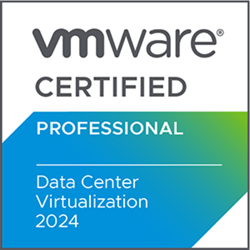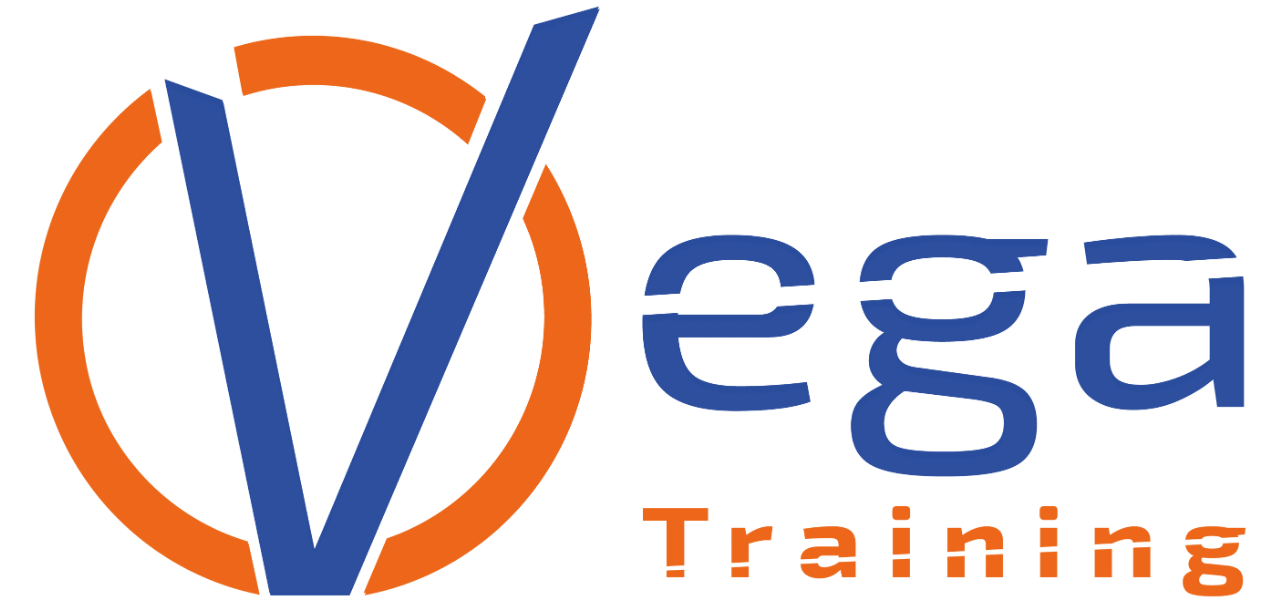Obiettivi | Certificazione | Contenuti | Tipologia | Prerequisiti | Durata e Frequenza | Docenti | Modalità di Iscrizione | Calendario

Il corso Corso VMware vSphere VCP-DCV 2024 [V8] è la combinazione di due percorsi VMware vSphere: Install, Configure, Manage [V8] e VMware vSphere: Operate, Scale and Secure [V8], in un unico bundle per massimizzare la preparazione e minimizzare i costi. Il prerequisito fondamentale per accedere alla Certificazione VCP-DCV 2024 è la partecipazione ad un corso autorizzato VMware, unito allo svolgimento dei laboratori didattici di virtualizzazione che permettono allo studente di acquisire esperienza pratica su VMware vSphere [V8] (ESXi [V8] e vCenter Server [V8]). Questo percorso combina diversi corsi VMware vSphere, in un unico percorso formativo, in una formula che presenta continuità, omogeneità ed efficacia didattica, rispetto ad una formula classica a corsi separati, frammentati e ripetitivi. L’efficacia didattica di questo corso la si ottiene anche grazie alla massimizzazione dell’utilizzo dei laboratori hands-on di ultimissima generazione, basati su scenari di configurazione reali e case-studies, che incrementano e formano le skills di troubleshooting e problem-solving che le aziende richiedono agli specialisti VMware VCP-DCV. E’ il corso fondamentale per amministrare infrastrutture basate su tecnologie VMware di Software-defined data center di qualsiasi grandezza e orientate al Cloud. VMware, con i suoi prodotti, è l’azienda leader nelle tecnologie di virtualizzazione, che oggi sono i pilastri fondamentali del mondo IT e del Cloud Computing, permettendo all’azienda di ridurre i consumi energetici, gli spazi aziendali dedicati alle infrastrutture IT e i costi di manutenzione e gestione delle stesse e quindi massimizzando l’efficienza IT. L’importanza di queste tecnologie deriva da una domanda, costantemente in crescita, di professionisti IT, esperti nella realizzazione, gestione e configurazione di data centers virtualizzati SDDC (Software Defined Data Center). Il corso contribuisce alla preparazione dell’esame di Certificazione VMware Certified Professional Data Center Virtualization (VCP-DCV 2024).
Sintesi Statistica :
- Corsi realizzati: 145;
- Numero Corsisti: 1329;
- Superamento Esame: 95,85%
Contattaci ora per ricevere tutti i dettagli e per richiedere, senza alcun impegno, di parlare direttamente con uno dei nostri Docenti (Clicca qui)
oppure chiamaci subito al nostro Numero Verde (800-177596)
Obiettivi del corso
Di seguito una sintesi degli obiettivi principali del Corso VMware vSphere VCP-DCV 2024 [V8]:
- Installazione e configurazione di ESXi e vCenter.
- Creazione e gestione di reti virtuali con switch standard e distribuiti.
- Configurazione e gestione di datastores con tecnologie di storage supportate da vSphere.
- Uso di vSphere Client per creare macchine virtuali, template, cloni e snapshot.
- Configurazione e gestione di cluster vSphere per alta disponibilità e distribuzione delle risorse.
- Gestione delle risorse VM con pool di risorse.
- Configurazione avanzata di reti e storage in VMware vSphere.
- Uso di profili host per la conformità degli host VMware ESXi™ 8.
Certificazione del corso
Esame VMware Certified Professional Data Center Virtualization (VCP-DCV 2024); Questo Esame valuta la competenza nell’implementazione e gestione di VMware vSphere, comprese le architetture ESXi e vCenter Server. Si concentra sui concetti di storage, reti e cluster, incluso il dettaglio su protocolli di storage e tipi di datastore, oltre a configurazioni avanzate di storage e politiche. L’esame copre anche la configurazione di switch distribuiti e standard, la gestione di vSphere Distributed Switch, e l’ottimizzazione delle risorse di rete. Viene anche esplorato il Lifecycle Manager di vSphere, la sicurezza delle macchine virtuali, l’identità federata e la gestione di vSphere con Tanzu. È incluso l’uso di VMware vSphere in data center software-defined, la configurazione di vSphere Trust Authority e l’ottimizzazione delle prestazioni, oltre a compiti amministrativi e operativi come la creazione e gestione di snapshot di macchine virtuali.
Contenuti del corso
- Course Introduction
- Introductions and course logistics
- Course objectives
- vSphere and Virtualization Overview
- Explain basic virtualization concepts
- Describe how vSphere fits in the software-defined data center and the cloud infrastructure
- Recognize the user interfaces for accessing vSphere
- Explain how vSphere interacts with CPUs, memory, networks, storage, and GPUs
- Installing and Configuring ESXi
- Install an ESXi host
- Recognize ESXi user account best practices
- Configure the ESXi host settings using the DCUI and VMware Host Client
- Deploying and Configuring vCenter
- Recognize ESXi hosts communication with vCenter
- Deploy vCenter Server Appliance
- Configure vCenter settings
- Use the vSphere Client to add and manage license keys
- Create and organize vCenter inventory objects
- Recognize the rules for applying vCenter permissions
- View vCenter logs and events
- Configuring vSphere Networking
- Configure and view standard switch configurations
- Configure and view distributed switch configurations
- Recognize the difference between standard switches and distributed switches
- Explain how to set networking policies on standard and distributed switches
- Configuring vSphere Storage
- Recognize vSphere storage technologies
- Identify types of vSphere datastores
- Describe Fibre Channel components and addressing
- Describe iSCSI components and addressing
- Configure iSCSI storage on ESXi
- Create and manage VMFS datastores
- Configure and manage NFS datastores
- Deploying Virtual Machines
- Create and provision VMs
- Explain the importance of VMware Tools
- Identify the files that make up a VM
- Recognize the components of a VM
- Navigate the vSphere Client and examine VM settings and options
- Modify VMs by dynamically increasing resources
- Create VM templates and deploy VMs from them
- Clone VMs
- Create customization specifications for guest operating systems
- Create local, published, and subscribed content libraries
- Deploy VMs from content libraries
- Manage multiple versions of VM templates in content libraries
- Managing Virtual Machines
- Recognize the types of VM migrations that you can perform within a vCenter instance and across vCenter instances
- Migrate VMs using vSphere vMotion
- Describe the role of Enhanced vMotion Compatibility in migrations
- Migrate VMs using vSphere Storage vMotion
- Take a snapshot of a VM
- Manage, consolidate, and delete snapshots
- Describe CPU and memory concepts in relation to a virtualized environment
- Describe how VMs compete for resources
- Define CPU and memory shares, reservations, and limits
- Deploying and Configuring vSphere Clusters
- Create a vSphere cluster enabled for vSphere DRS and vSphere HA
- View information about a vSphere cluster
- Explain how vSphere DRS determines VM placement on hosts in the cluster
- Recognize use cases for vSphere DRS settings
- Monitor a vSphere DRS cluster
- Describe how vSphere HA responds to various types of failures
- Identify options for configuring network redundancy in a vSphere HA cluster
- Recognize vSphere HA design considerations
- Recognize the use cases for various vSphere HA settings
- Configure a vSphere HA cluster
- Recognize when to use vSphere Fault Tolerance
- Managing the vSphere Lifecycle
- Enable vSphere Lifecycle Manager in a vSphere cluster
- Describe features of the vCenter Update Planner
- Run vCenter upgrade prechecks and interoperability reports
- Recognize features of VMware vSphere® Lifecycle Manager™
- Distinguish between managing hosts using baselines and managing hosts using images
- Describe how to update hosts using baselines
- Describe ESXi images
- Validate ESXi host compliance against a cluster image and update ESXi hosts
- Update ESXi hosts using vSphere Lifecycle Manager
- Describe vSphere Lifecycle Manager automatic recommendations
- Use vSphere Lifecycle Manager to upgrade VMware Tools and VM hardware
- Virtual Machine Operations
- Recognize the role of a VMware ToolsTM Repository
- Configure a VMware Tools Repository
- Recognize the backup and restore solution for VMs
- Identify the components in the VMware vSphere® ReplicationTM architecture
- Deploy and configure vSphere Replication and VMware Site RecoveryTM instances
- Recover replicated VMs
- vSphere Cluster Operations
- Create and manage resource pools in a cluster
- Describe how scalable shares work
- Describe the function of the vCLS
- Recognize operations that might disrupt the healthy functioning of vCLS VMs
- Network Operations
- Configure and manage vSphere distributed switches
- Describe how VMware vSphere® Network I/O Control enhances performance
- Explain distributed switch features such as port mirroring and NetFlow
- Define vSphere Distributed Services Engine
- Describe the use cases and benefits of VMware vSphere® Distributed Services EngineTM
- Storage Operations
- Discuss vSphere support for NVMe and iSER technologies
- Describe the architecture and requirements of vSAN configuration
- Describe storage policy-based management
- Recognize components in the VMware vSphere® Virtual VolumesTM architecture
- Configure Storage I/O Control
- vCenter and ESXi Operations
- Create a vCenter backup schedule
- Recognize the importance of vCenter High Availability
- Explain how vCenter Server High Availability works
- Use host profiles to manage ESXi configuration compliance
- Recognize the benefits of using configuration profiles
- Use the vSphere client and the command line to manage certificates
- vSphere Monitoring
- Monitor the key factors that can affect a virtual machine’s performance
- Describe the factors that influence vCenter performance
- Use vCenter tools to monitor resource use
- Create custom alarms in vCenter
- Describe the benefits and capabilities of VMware SkylineTM
- Recognize uses for VMware Skyline AdvisorTM Pro
- vSphere Security and Access Control
- Recognize strategies for securing vSphere components, such as vCenter, ESXi hosts, and virtual machines
- Describe vSphere support for security standards and protocols
- Describe identity federation and recognize its use cases
- Configure identity federation to allow vCenter to use an external identity provider
- vSphere Trusted Environments and VM Encryption
- Configure ESXi Host Access and Authentication
- Describe virtual machine security features
- Describe the components of a VM encryption architecture
- Create, manage, and migrate encrypted VMs
- List VM encryption events and alarms
- Describe the benefits and use cases of vSphere Trust Authority
Attività Laboratoriali
- Configuring an ESXi Host
- Creating and Managing the vCenter Inventory Objective
- Adding an Identity Source
- Users Groups and Permissions
- Creating Standard Switches
- Configuring vSphere Distributed Switches
- Accessing iSCSI Storage
- Managing VMFS Datastores
- Accessing NFS Storage Objective
- Creating and Removing a Virtual Machine
- (Simulation) Installing VMware Tools
- Adding Virtual Hardware
- Modifying Virtual Machines
- Creating Templates and Deploying VMs
- Using Local Content Libraries
- Using Subscribed Content Libraries
- Versioning VM Templates in Content Libraries
- vSphere vMotion Migrations
- vSphere Storage vMotion Migrations
- Working with Snapshots
- Controlling VM Resources
- Implementing vSphere DRS Clusters
- Configuring vSphere HA
- Using vSphere Lifecycle Manager
- Configuring a Centralized VMware Tools Installation Repository
- (Simulation) Deploying vSphere Replication and Site Recovery Instances
- (Simulation) Configuring Replication for a Single VM
- Managing Resource Pools
- Enabling vCLS Retreat Mode
- Configuring vSphere Distributed Switch
- Managing vSphere Distributed Switches
- Using Port Mirroring
- Viewing a vSAN Datastore Configuration
- Using Policy-Based Storage
- Creating vSAN Storage Policies
- Using Host Profiles
- Working with Certificates
- Monitoring Virtual Machine Performance
- Using Alarms
- Configuring Lockdown Mode
- (Simulation) Configuring Identity Federation to Use Microsoft ADFS
- Configuring vCenter to work with an external KMS
- Creating an Encrypted Virtual Machine
Tipologia
Corso di Formazione con Docente
Docenti
I docenti sono Istruttori Autorizzati VMware e in altre tecnologie IT, con anni di esperienza pratica nel settore e nella Formazione.
Infrastruttura laboratoriale
Per tutte le tipologie di erogazione, il Corsista può accedere alle attrezzature e ai sistemi presenti nei Nostri laboratori o direttamente presso i data center del Vendor o dei suoi provider autorizzati in modalità remota h24. Ogni partecipante dispone di un accesso per implementare le varie configurazioni avendo così un riscontro pratico e immediato della teoria affrontata. Ecco di seguito alcuni scenari tratti dalle attività laboratoriali:
![Corso VMware vSphere VCP-DCV 2023 [V8]](https://www.vegatraining.eu/wp-content/uploads/2023/12/Corso-VMware-vSphere-VCP-DCV-2023-V8.jpg)
Dettagli del corso
Prerequisiti
- Si consiglia la partecipazione al Corso CompTIA A+ o possedere competenze equivalenti.
Durata del corso
Durata 69 ore;
Varie tipologie di Frequenza Estensiva.
Formule Intensive 5gg:
- Corso VMware vSphere: Install, Configure, Manage [V8]
- Corso VMware vSphere: Operate, Scale and Secure [V8]
Frequenza
Varie tipologie di Frequenza Estensiva ed Intensiva.
Date del corso
- Corso VMware vSphere VCP-DCV 2024 [V8] (Formula Estensiva Serale) – 24/09/2024 – Mar. Gio. 18:30/21:30
Vedi anche la formula intensiva:
- Corso VMware vSphere: Install, Configure, Manage [V8]
- Corso VMware vSphere: Operate, Scale and Secure [V8]
Modalità di iscrizione
Le iscrizioni sono a numero chiuso per garantire ai tutti i partecipanti un servizio eccellente.
L’iscrizione avviene richiedendo di essere contattati dal seguente Link, o contattando la sede al numero verde 800-177596 o inviando una richiesta all’email [email protected].


